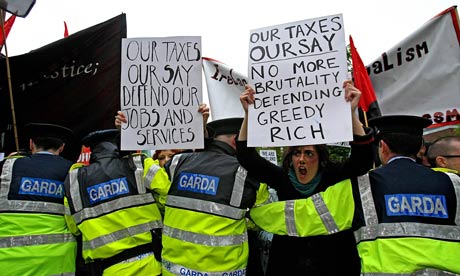This diary is guaranteed to cheer you up… How?
Firstly, as Americans, you ought to know that there are many European countries who have responded in an even worse fashion to even more parlous economic woes. Secondly, there’s always the immense intellectual satisfaction of “I told you so” when exploring the further disastrous ramifications of our global financial system.
Even if you’re facing unemployment, surveying your recently repossessed house, is there at least some residual bleak satisfaction in saying “I was right”?

Follow me below the fold for an international schadenfreudefest (™ Strummerson)
Exhibit A: Ireland; The Celtic Tiger Eats its Own
Once hailed as the Celtic Tiger, Ireland was one of the fastest growing economies in the EU from the relative poverty of the 1980s (when I first visited it) to the spectacularly expensive inaffordable place I reencountered a couple of years ago.
Dublin had changed beyond all recognition. Everywhere was gentrified, and every other building seemed to be a bank. A round of Guinesses suddenly set you back 30 bucks or more. House prices in the capital were more expensive than London, and even a tiny cottage in remote Kerry (where I was attending the wedding of one of Obama’s staff) was priced at a staggering $300,000.
But all this wealth was based on massive bank deregulation, derivatives, personal debt, and propounded on the ridiculous and unsustainable rise in property prices. The Economist Morgan Kelly foresaw all this in 2007
Kelly, of University College Dublin, was laughed at, scorned and even threatened when he correctly predicted, as long ago as 2007, that Ireland’s property bubble was heading for a spectacular explosion.
Now he is forecasting mass mortgage defaults and an ugly popular uprising. The first stirrings are already visible, he says, with “anxiety giving way to the first upwellings of an inchoate rage and despair that will transform Irish politics along the lines of the Tea Party in America”, giving rise to a new “hard-right, anti-Europe, anti-traveller party”.
So you heard it here first. Your domestic Tea Party may be an early adopter of inchoate right wing rage, but the real backlash may find more expression in Europe, which has a more terrible history than the US on turning on strangers in its midst.
Exhibit B: The Rise of Right Wing Anti Immigrant Parties in Europe.
The rise of Islamophobia throughout Europe – a movement that has gathered a strange coalition of racists, anti clerical intellectuals, Neocons and Nationalist Conservatives – has already gained power within coalition Governments in traditionally liberal Denmark and Holland. The recent French vote to ban the wearing of Niquab in public places, the Swiss ban on the building of minarets, and the rise of the far anti immigrant right in Sweden, Austria, UK and Italy are just further portents. There is a mood of fear and retribution abroad here, which focuses not only the various Pakistan, Turkish, Algerian or Moroccan immigrants, but has also led to the mass deportations of Roma from France, and – even more worryingly still – the capitulation of the traditionally anti-racist Centre Right to the politics of fear.

The Guardian is running a series on the rise of the anti immigrant right in Europe, which you can keep track of here.
This is not just scaremongering. When Angela Merkel, the centrist Chancellor of Germany, says that multiculturalism has “utterly failed”, then you know that Europe has shifted to the xenophobic right, in its economic centre.
I’m always impressed how many Americans, when they talk about their country’s success, energy and innovation, talk about the role the immigration in that story. I’ve heard various people talk about wanting more immigrants to the US, to help power the country out of the economic doldrums….
That never ever happens in Europe.
So. Do you feel better or worse now?
Less flippantly, we’ve often warned of/talked about analogies with the 1930s. But this anomaly never ceases to amaze me
Why are those the least responsible, migrant labour, the victims already of globalisation and the fluidity of the financial markets, always the first to be blamed for its collapse?
UPDATE: Some more intriguing, indeed scary details, about the Irish situation can impact on other countries, in my comment below.
149 comments